初一英语面授讲义15
代词考点讲义15反身代词和相互代词高频知识点用法总结- 新高考高中英语语法二轮复习

新高考高中英语语法二轮复习【全国通用】代词考点讲义15【精讲版】反身代词和相互代词高频知识点用法总结常考用法2. 反身代词的句法功能(1) 反身代词用作同位语反身代词主要用于加强被修饰词的语气,通常紧放在被修饰名词或代词后,或放在句末。
如:I prefer to do the work myself. 我宁愿自己干这工作。
I myself heard him say so yesterday. 我昨天亲自听他这么说的。
注意下列句子的区别:I did it myself. 是我亲自做的。
(是我做的,而不是别人做的。
)I did it by myself. 我独自做的。
(我自己做的,没有其他任何人的帮助。
)(2) 反身代词用作宾语反身代词既可用作动词宾语,也可用介词宾语。
如:He appeared to be talking to himself. 他仿佛在跟自己讲话。
I don’t blame you; I blame myself.我不怪你,我怪我自己。
注意,当宾语与句子主语指同一个人或事物时,动词后的宾语不能用宾格代词,而应用反身代词。
如:当我在镜子里看到自己时,我大为震惊。
误:I got such a shock when I saw me in the mirror.正:I got such a shock when I saw myself in the mirror.(3) 反身代词用作表语反身代词有时可以表示主语和表语为同一人或同一事物。
如:The poor boy was myself. 那个可怜的孩子就是我自己。
注意,反身代词用于 be, feel, seem, look 等后作表语,还可表示身体或精神处于正常状态。
如:I don’t know what’s the matter with me. I’m not myself today.我不知道是怎么啦。
今天我感到不舒服。
3. 反身代词用于习语反身代词在一些习语中的用法值得注意。
英语培训班七年级下学期第15次课教案
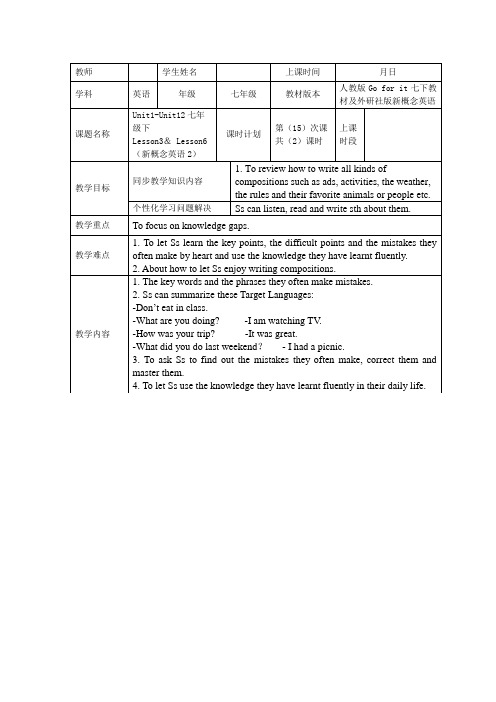
Ss can listen,readandwrite sthabout them.
教学重点
To focus on knowledge gaps.
教学难点
1. Tolet Ss learn the key points, the difficult points and themistakes they often make by heart and use the knowledge they have learnt fluently.
教师
学生姓名
上课时间
月日
学科
英语
年级
七年级
教材版本
人教版Goforit七下教材及外研社版新概念英语
课题名称
Unitn6(新概念英语2)
课时计划
第(15)次课
共(2)课时
上课
时段
教学目标
同步教学知识内容
1.Toreviewhow to writeall kinds of compositions such as ads,activities, the weather,the rules and theirfavorite animals or people etc.
()3.A.laughed B.knocked C.lookedD.saw
()4.A.please B.pleased C.pleasureD.sad
()5.A.to B.forC.inD.at
()6.A.talked B.askedC.spokeD.said
()7.A.and B.butC.soD.or
he8at home.So Tom answered,“NO,Sir.He Was busy last night,so I9to do it10.”
2022年初中英语中考语法基础版复习讲义(十五)复合不定代词知识点总结(含练习)
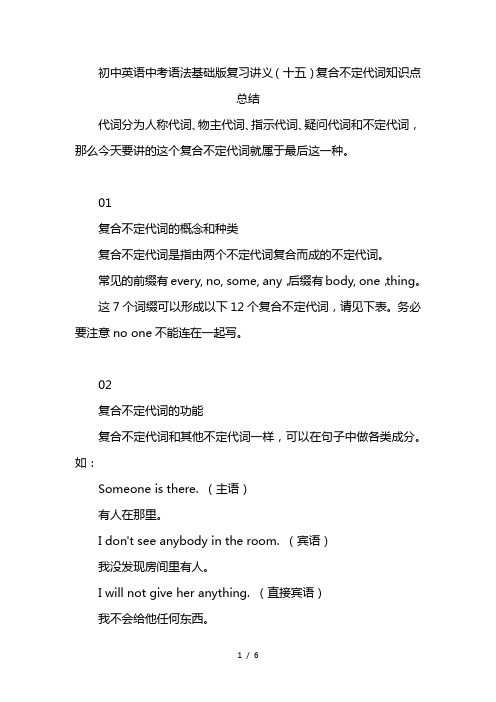
初中英语中考语法基础版复习讲义(十五)复合不定代词知识点总结代词分为人称代词、物主代词、指示代词、疑问代词和不定代词,那么今天要讲的这个复合不定代词就属于最后这一种。
01复合不定代词的概念和种类复合不定代词是指由两个不定代词复合而成的不定代词。
常见的前缀有every, no, some, any,后缀有body, one,thing。
这7个词缀可以形成以下12个复合不定代词,请见下表。
务必要注意no one不能连在一起写。
02复合不定代词的功能复合不定代词和其他不定代词一样,可以在句子中做各类成分。
如:Someone is there. (主语)有人在那里。
I don't see anybody in the room. (宾语)我没发现房间里有人。
I will not give her anything. (直接宾语)我不会给他任何东西。
You are somebody. (表语)你是个人物。
03复合不定代词的三个注意事项复合不定代词的以下用法要注意:a. 复合不定代词做主语,谓语一般要用单数。
“Something delicious is coming,”the tiger thinks.“有好吃的东西靠近”,老虎想。
Everybody wants to kiss the baby.每个人都想亲亲那个宝宝。
b. some和some开头的复合不定代词一般用于肯定句,any 和any开头的复合不定代词一般用在否定句和疑问句。
I have got something to print.我有一些要打印的东西。
I don't want anyone to interrupt me.我不想让任何人打扰我。
注意:当询问吃喝,并想得到肯定的答案时,疑问句中可以用some。
如:would you like to have some water?你想来点水吗?此外,当anyone/thing表是任何的含义时,也可以用在肯定句中。
七年级英语讲义
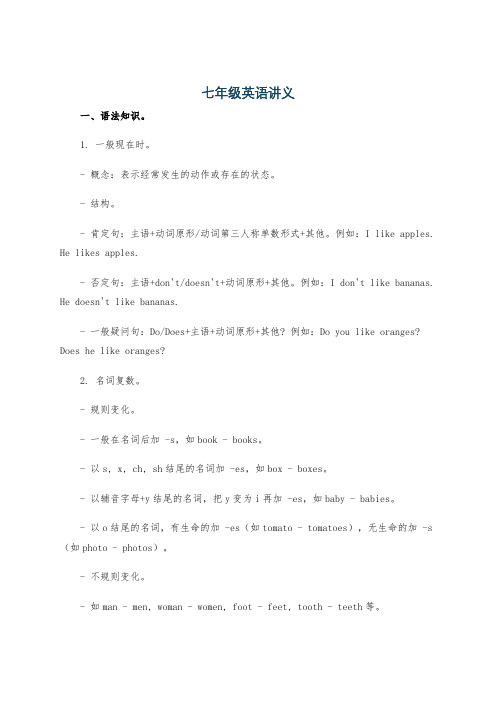
七年级英语讲义一、语法知识。
1. 一般现在时。
- 概念:表示经常发生的动作或存在的状态。
- 结构。
- 肯定句:主语+动词原形/动词第三人称单数形式+其他。
例如:I like apples. He likes apples.- 否定句:主语+don't/doesn't+动词原形+其他。
例如:I don't like bananas. He doesn't like bananas.- 一般疑问句:Do/Does+主语+动词原形+其他? 例如:Do you like oranges? Does he like oranges?2. 名词复数。
- 规则变化。
- 一般在名词后加 -s,如book - books。
- 以s, x, ch, sh结尾的名词加 -es,如box - boxes。
- 以辅音字母+y结尾的名词,把y变为i再加 -es,如baby - babies。
- 以o结尾的名词,有生命的加 -es(如tomato - tomatoes),无生命的加 -s (如photo - photos)。
- 不规则变化。
- 如man - men, woman - women, foot - feet, tooth - teeth等。
3. 形容词性物主代词。
- 包括my(我的)、your(你的/你们的)、his(他的)、her(她的)、its (它的)、our(我们的)、their(他们的)。
- 用法:形容词性物主代词后面必须接名词,用来表示所属关系。
例如:This is my book.二、词汇积累。
1. 家庭成员类。
- father(父亲)、mother(母亲)、parent(父母)、grandfather(祖父/外祖父)、grandmother(祖母/外祖母)、grandparent(祖父母/外祖父母)、brother (兄弟)、sister(姐妹)、son(儿子)、daughter(女儿)等。
七年级英语Unit 15—Unit 19(第15单元—第19单元)人教版知识精讲

七年级英语Unit 15—Unit 19(第15单元—第19单元)人教版【同步教育信息】一. 本周教学内容:Unit 15—Unit 19(第15单元—第19单元)二. 复习重难点:1. 时间表达法2. 基数词1—1003. 形容词4. 提供和请求帮助5. 人称代词(主格/宾格)6. How many句型7. some的用法【模拟试题】一. 语音:选择划线部分发音不同的词()1. A. game B. watch C. what D. want()2. A. give B. fifteen C. time` D. midnight()3. A. school B. watch C. lunch D. much()4. A. from B. o’clock C. orange D. glove()5. A. why B. twenty C. very D. family()6. A. have B. family C. black D. table()7. A. sock B. worry C. other D. some()8. A. easy B. please C. great D. meat()9. A. away B. Monday C. today D. play()10. A. buses B. glasses C. houses D. classes二. 词汇:a. 写出划线部分的反义词:1. We are in the same class. They are in rows.2. I can’t answer the question. Please go and Miss Zhao.3. I think you are right. That’s .4. e here. Don’t go .5. This bottle is empty. Give me a one.b. 用所给词的适当形式填空:1. Their are Mike and Tom.(name)2. name is Gao Wei. (my teacher)3. This is book. (you)That is . (my)4. Can we put coats there? (we)No, put there. (they)5. We are . (china)c. 根据句意填空,使句子意思完整:1. What’s the time? Sorry, I have no .2. I don’t know the time. It’s nine o’clock.3. It’s hot here. off your coat.4. We go to school Monday to Friday.5. This is a new of Tom’s family.三. 单选:()1. can you see on the teacher’s desk? A light.A. WhoB. What’sC. WhereD. What ()2. are you, Mr Green? Fine, thank you. And you?A. HowB. WhereC. WhatD. Which ()3. Who’s duty today?A. atB. onC. inD. /()4. Look the picture on the wall. It is a picture my family.A. of, ofB. on, aboutC. at, ofD. of, at ()5. I’m in Row 5. Tom is in Row 6. So he’s me.A. nextB. behindC. overD. under ()6. Who is that man a black coat?A. inB. onC. atD. for ()7. I can see two doors this wall and two pictures it.A. on, onB. in, inC. on, atD. in, on ()8. A:Who is this woman? B:Which woman?A:The one the white bike.A. onB. inC. underD. to()9. Whose shirts are these? They are .A. he’sB. she’sC. hisD. his’s()10. A:Where’s the bag? B:Sorry, I don’t know.A. teachersB. teacher’sC. teacherD. teacher is()11. The two girls go to bed 10:00.A. onB. inC. toD. at()12. A:Hello, Lin Tao! Nice to see you. B:.A. How are you.B. Nice to see you.C. What’s your name.D. Who’s this man?()13. Whose are those?A. shoeB. a shoeC. shoesD. shose()14. What’s this in English? It’s apple. It’s red apple.A. a, aB. an, anC. a, anD. an, a()15. Wu Dong: Excuse me, Tom, I can’t find my pencil. Can you see it?Tom: Sorry, .A. I can’tB. I don’tC. I am notD. I can()16. I am a boy. name is Jim.A. IB. MyC. MineD. His()17. It’s 5:20 in the afternoon. Let’s .A. get upB. go to bedC. go to schoolD. go home()18. It’s 6:30 a.m. It’s time to .A. go to schoolB. play gamesC. get upD. watch TV()19. This is Mr Zhang’s pen. Please .A. give it to himB. give him itC. give it himD. give him to it ()20. It’s time .A. play gamesB. to play gamesC. to play gameD. play game四. 句型转换:1. Please put your shoes under the bed.(否定句)your shoes under the bed, please.2. I have a nice cat. (一般疑问句)have a nice cat?3. My pencil is broken. (划线提问)with your pencil?4. I have a bottle of water. (复数)I have of .5. I’d like some rice and fish.(划线提问)you like?五. 汉译英:1. 让我帮助你扛这个包。
人教版七年级下册英语讲义(完整版)

人教版七年级下册英语讲义(完整版)新目标英语七年级下册知识点总结Unit 1 Canyou playthe guitar?1,情态动词+V原cando=be able to do2,Play+ the+ 乐器+球类,棋类3,join参加社团、组织、团体4,4个说的区别:say+内容Speak+语言Talk 谈论talk about sthtalkwithsbtalktosbTell 告诉,讲述tell sb (not)todo sthTell stories/jokes5,want=would like +(sb)to do sth6,4个也的区别:too肯定句末(前面加逗号)Either否定句末(前面加逗号)Also 行前be 后As well 口语中(前面不加逗号)7,begood at+V-ing=do well in 擅长于begood for 对…有益(be bad for对…有害)be goodto 对…友好(good 可用friendly,nice,kind替换)be goodwith和…相处好=get on/alongwell with8,特殊疑问句的构成:疑问词+一般疑问句9,How/what about+V-in g…怎么样?(表建议)10,感官动词(look, sound, taste, sm ell,feel)+adj/ like11,选择疑问句:回答不能直接用Yes或者No,要从中选择一个回答12,studentswanted forschool show(wanted表示招募,含有被动意义) 13,show sth to sb=show sb sthgive sthto sb=givesb sth 14,help sb (to)do sth Help sb with sthWith sb’s help= with the help ofsbHelponeself to随便享用15,bebusy doing sth/be busywith sth16,needtodo sth17,be free= havetime18,have friends= make friends19,callsb at +电话号码20,ontheweekend= onweekends21,English-speaking students 说英语的学生(带有连词符,有形容词性质)22,dokungfu表演功夫Unit 2What time do you go toschool?1,问时间用what time或者whenAt+钟点at 7 o’clock at noon/ at night(during/ inthe day)On+ 具体某天、星期、特指的一天onApril 1stonSundayon acoldwinter morningIn +年、月、上午、下午、晚上2,时间读法:顺读法逆读法:分钟≤30用pastfivepast eight(8:05)half pasteight(8:30)分钟>30用toaquarter toten(9:45)整点用…o’clock7o’clock(7:00)3,3个穿的区别:wear 表状态,接服装、手套、眼镜、香水等Put on 表动作,接服装Dress 表动作,接sb/oneself get dressed穿衣3,感叹句:How+adj+主谓!How+adj+a/an+n单+主谓!What+a/an+adj+n单+主谓!What+ adj+ n复/ 不可数+主谓!4,from…to…5,be/arrive late for6,频度副词(行前be 后)Always usually oftensometimesseldomhardlynever7,一段时间前面要用介词for for halfan hour for fiveminutes8,eat/have… forbreakfast/lunch/ dinner/supper9,either…or10,a lot of=lots of11,it is +adj+for sb+to dosth (adj修饰to do sth)It is importantforme to learn English.it is+adj+of sb +to do sth(adj修饰sb)It is kind/friendly/niceofyou to help me.Unit 3Howdo you getto school?1,疑问词How如何(方式)how long 多长(时间)答语常用“(For/about +)时间段”how far多远(距离)答语常用“(It’s+)数词+miles/meters/kilometers”howoften多久一次(频率)答语常用“Always/ often/ every day/…”或“次数+时间”等表频率的状语How soon多快,多久以后,常用在将来时中。
第15讲:趣味阅读L14—时态综合—阅读C篇—牛津7A U5单词预习 牛津上海版英语七年级暑假班讲义
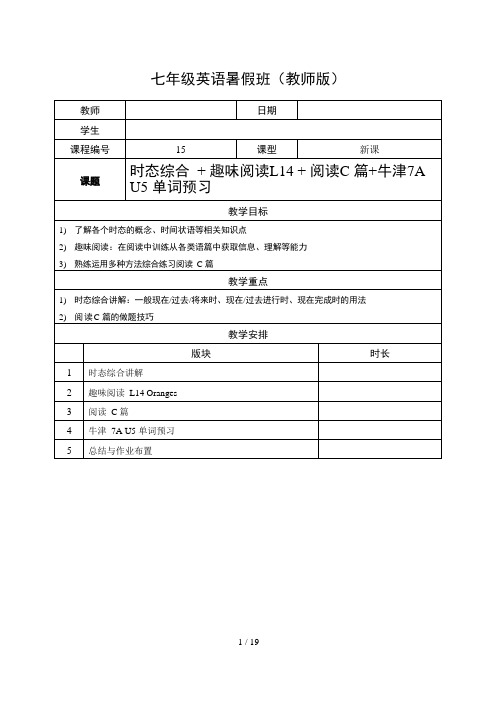
七年级英语暑假班(教师版)Lesson 14 OrangesEverybody loves oranges. They are sweet and juicy. They are in sections, so it is easy to eat them. Some oranges do not have any seeds. Some have a thick skin, and some have a thin skin.The orange tree is beautiful. It has a lot of shiny green leaves. The small white flowers smell very sweet. An orange tree has flowers and fruit at the same time.There were orange trees twenty million years ago. The oranges were very small, not like the ones today. The orange tree probably came from China. Many different kinds of wild oranges grow there today. The Chinese started to raise orange trees around 4,400 years ago. Chinese art has lovely old pictures of oranges and orange trees.Farmers in other parts of Asia and the Middle East learned to raise oranges from the Chinese. Then they taught Europeans. The Spanish planted orange trees in the New World (North and South America). They took them to Florida first. Oranges are a very important crop in Florida today.In English, orange means both a fruit and a color. We use the name of the fruit for the color. (193 words)A.Vocabularyaround wild sections lovelyskin oranges raise smellseeds shiny thin sweet1.The Chinese started to orange trees 4,400 years ago.2.They are3.Some have a thick and juicy., and some have a skin.4.Many different kinds of oranges grow there today.5.They are in , so it is easy to eat them.6.Chinese art has old pictures of oranges and orange trees.7.Some oranges do not have any .8.It has a lot of green leaves.【难度】★★【答案】1. raise, around 2. sweet 3. skin, thin 4. wild1. Reading for fun5. section6. lovely7. seeds8. shinyB.Vocabulary: New Context1.Japanese fish on farms in the sea.2.The Syrians made pictures of date palms on stone buildings.3.Plants grow from .4.A bird has feathers on its . A camel has hair.5.The polar bear and the hippo are animals.6.There are three of the beginning class.7.The sun every day in the desert.8.Dates and oranges are .9.Carlos is fat. Pablo is .10.People start eating dates 7,000 years ago.【难度】★★【答案】1. raise 2. lovely 3. seeds 4. skin 5. wild6. sections7. shines8. sweet9. thin 10. aroundC.Vocabulary Review1.Sweden is of Norway and of Finland.2.Students always very busy at the end of the semester.3.Many kinds of eat farmer’s crops.4.The Smiths have all around their house. There are also flowers and trees.5.Desert is very dry.6.People can get some from drinking dirty water.7.Tom looked everywhere for his dictionary. He looked in his car.8.Roverto is an . He works in Geneva.9.Tourists usually go to art to see beautiful pictures.10.Your feet feel cool when you wear .11.Lois is a student than Helen. Helen is not a good student.12.The is on the outside of the house. The ceiling is on the inside.【难度】★★【答案】1. east, west 2. become 3. insects 4. grass 5. soil 6. diseases7. even 8. interrupt 9. museums 10. sandals 11. better 12. roofD.QuestionsThe asterisk (*) means you have to think of the answer. You cannot find it in the text.1.Describe an orange.2.Do all oranges have seeds?3.Describe an orange tree.4.Where did orange trees probably come from?*5. Who plants wild orange trees?6.How did Europeans learn to raise oranges?7.How did the United States get orange trees?8.What does orange mean?9.Why did people in Saudi Arabia eat dates instead of oranges?【难度】★★★【答案】1. An orange is a fruit that is sweet and juicy. Some have no seeds. Some have thick or thin skins.2.No.3.It is beautiful with shiny leaves, small white flowers, and there are fruit and flowers at the same time.4.China.*5. No one.6.Farmers from parts of Asia and the Middle East learned from the Chinese and taught them.7.From the Spanish8.A color and a fruit*9. Possible answer: Dates are easy to grow in Saudi Arabia, and it is too dry to grow oranges there.prehension: Multiple ChoicePut a circle around the letter of the best answer. The asterisk (*) means you have to think of the answer. You can not find it in the text.1.Oranges are .a.shiny and green c. sweet and juicyb.old and wild d. thin and white2.Some oranges do not have .a. seedsb. sectionsc. flowersd. a skin3.Orange leaves are .a. shinyb. thickc. sweetd. wild4.There are many orange trees in China today.a. shinyb. thinc. wildd. thick5.Europeans learned to plant orange trees from farmers in .a. the Middle East and Asiab. Floridac. Chinad. Spain*6. Oranges do not grow in .a. Indiab. Swedenc. Mexicod. North Africa【难度】★★【答案】1. c 2. a 3. a 4. c 5. a 6. bF.Main ideaCircle the number of the main idea of the text.1.Oranges are sweet and juicy with seeds and a skin.2.Orange trees went from Asia to the Middle East to Europe to the New World.3.Oranges probably came from China, and today people all over the world like them because they are sweet and juicy.【难度】★【答案】3一.现在完成时1.现在完成时的基本用法(1)过去发生并且已经完成的动作对现在造成影响。
聚焦新中考英语大一轮复习讲义 第1课 七年级上册 Units 15课件
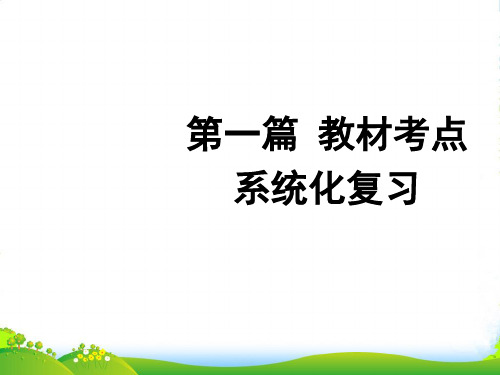
( A )(2)—Jack, could you tell me ________? —Sure. In the post office on Green Road. A. where you bought the stamps B. where did you buy the stamps C. when you bought the stamps D. when did you buy the stamps
◎即学即用7: (1)谢谢你上星期带我参观学校。
Thanks for showing me the school last week. (2)我房间的门坏了。
The door of my room is broken. (3)我爸爸的一个朋友是老师。
A friend of my father’s is a teacher.
—No, you needn’t ./No, you don’t have to .
重点句型
1. What’s this in English? ◎典例体验 —What’s this in English? 这用英语怎么说? —It’s an apple. 这是一个苹果。 What’s your name? 你叫什么名字? What do you often do on weekends? 周末你经常做什么? What does she do?/What’s she? 她的职业是什么? What color is your shirt? 你的衬衫是什么颜色的? What size of shoes do you want? 你要多大码的鞋子? What kind of movie do you like? 你喜欢哪种电影?
易混辨异
1. a(an), the ◎观察思考 There is a backpack on the table. The backpack is John’s. 桌上有一个背包,这个背包是约翰的。 An apple a day can keep you away from the doctor. 一天一个苹果可以让你远离医生。
七年级英语下册知识讲义-Unit 3 Lesson 13-Lesson 15-冀教版
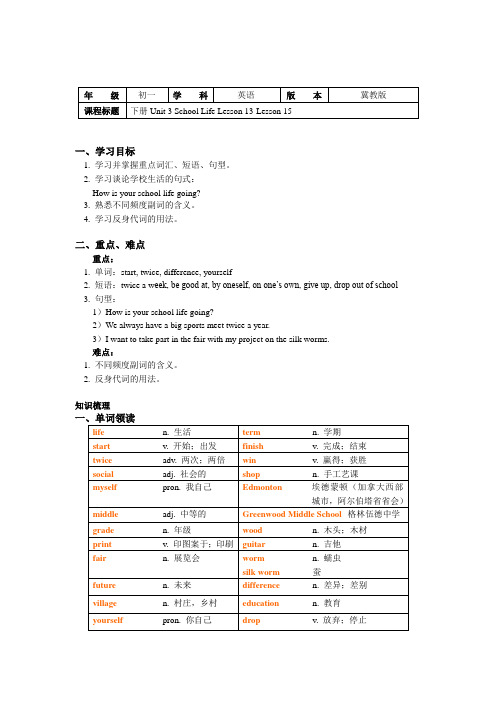
一、学习目标1. 学习并掌握重点词汇、短语、句型。
2. 学习谈论学校生活的句式:How is your school life going?3. 熟悉不同频度副词的含义。
4. 学习反身代词的用法。
二、重点、难点重点:1. 单词:start, twice, difference, yourself2. 短语:twice a w eek, be good at, by oneself, on one’s own, give up, drop out of school3. 句型:1)How is your school life going?2)We always have a big sports meet twice a year.3)I want to take part in the fair with my project on the silk worms.难点:1. 不同频度副词的含义。
2. 反身代词的用法。
知识梳理possible adj. 可能的never adv. 从来没有;决不二、重点单词【单词学习】1. start v. 开始;出发【用法】start既可以用作及物动词,也可以用作不及物动词,表示开始某一动作时,后面可接不定式,也可接动名词。
【例句】We start class at 8:00 in the morning. 我们早上八点钟开始上课。
He starts to work at half past eight every day. 他每天八点半开始工作。
【拓展】1. 意为“开始;发生;发起”时,与begin用法相同,两者可互换。
We begin to do our homework.= We start to do our homework. 我们开始写作业。
2. 表示开始某一动作时,后面接不定式或动名词所表达的意思是相同的。
The child began crying/ to cry. 那小孩开始哭了。
七年级英语15课的知识点
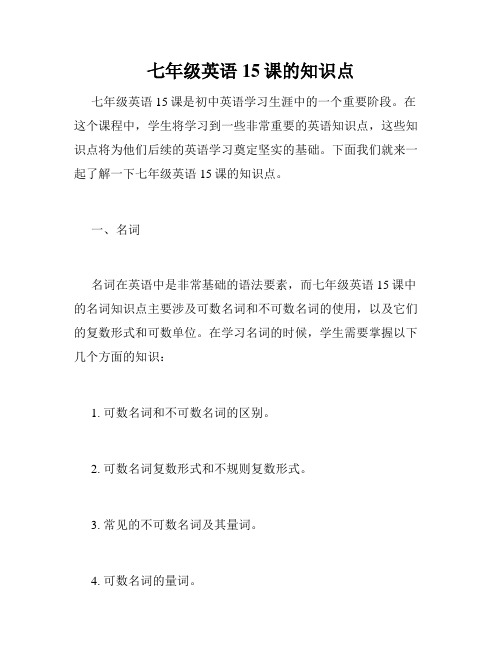
七年级英语15课的知识点七年级英语15课是初中英语学习生涯中的一个重要阶段。
在这个课程中,学生将学习到一些非常重要的英语知识点,这些知识点将为他们后续的英语学习奠定坚实的基础。
下面我们就来一起了解一下七年级英语15课的知识点。
一、名词名词在英语中是非常基础的语法要素,而七年级英语15课中的名词知识点主要涉及可数名词和不可数名词的使用,以及它们的复数形式和可数单位。
在学习名词的时候,学生需要掌握以下几个方面的知识:1. 可数名词和不可数名词的区别。
2. 可数名词复数形式和不规则复数形式。
3. 常见的不可数名词及其量词。
4. 可数名词的量词。
二、动词的时态动词的时态是英语中非常重要的知识点之一。
在七年级英语15课中,学生需要学习到现在时、过去时、将来时等常见时态。
此外,本节课还涉及to be和to have 的各种时态用法。
学生需要掌握以下几个方面的知识:1. 现在时态的基本用法及其变化形式。
2. 过去时态的基本用法及其变化形式。
3. 将来时态的基本用法及其变化形式。
4. to be 和to have 的常见时态用法。
三、疑问词疑问词是英语中一个重要的语法要素,本节课中的疑问词知识点主要涉及who, what, when, where, why, how, which等常见疑问词的使用。
学生需要掌握以下几个方面的知识:1. 常见疑问词及其使用场景。
2. 疑问词在句中的用法。
四、介词介词是英语中一个非常基础的语法要素,在七年级英语15课中,学生需要学习到常见介词的使用,以及介词和动词、形容词等的搭配。
学生需要掌握以下几个方面的知识:1. 常见介词及其使用场景。
2. 介词和动词、形容词等的用法。
五、情态动词情态动词是英语中一个非常重要的动词类别,它通常用来表达说话人的态度、意愿、能力等。
在七年级英语15课中,学生需要掌握常见的情态动词及其基本用法。
此外,学生还需要了解情态动词和其他动词的不同之处。
学生需要掌握以下几个方面的知识:1. 常见情态动词及其基本用法。
第15讲 Unit 2 (教师版)-新七年级英语暑假讲义(人教版)_new
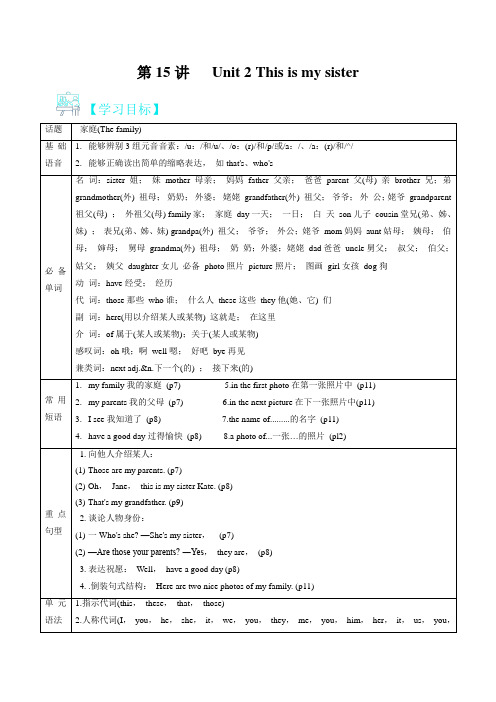
第15讲Unit 2 This is my sister【学习目标】话题家庭(The family)基础语音1.能够辨别3组元音音素:/u:/和/u/、/o:(r)/和/p/或/a:/、/a:(r)/和/^/2.能够正确读出简单的缩略表达,如that's、who's必备单词名词:sister姐;妹mother母亲;妈妈father父亲;爸爸parent父(母) 亲brother 兄;弟grandmother(外) 祖母;奶奶;外婆;姥姥grandfather(外) 祖父;爷爷;外公;姥爷grandparent 祖父(母) ;外祖父(母) family家;家庭day一天;一日;白天son儿子cousin堂兄(弟、姊、妹) ;表兄(弟、姊、妹) grandpa(外) 祖父;爷爷;外公;姥爷mom妈妈aunt姑母;姨母;伯母;婶母;舅母grandma(外) 祖母;奶奶;外婆;姥姥dad爸爸uncle舅父;叔父;伯父;姑父;姨父daughter女儿必备photo照片picture照片;图画girl女孩dog狗动词:have经受;经历代词:those那些who谁;什么人these这些they他(她、它) 们副词:here(用以介绍某人或某物) 这就是;在这里介词:of属于(某人或某物);关于(某人或某物)感叹词:oh哦;啊well嗯;好吧bye再见兼类词:next adj.&n.下一个(的) ;接下来(的)常用短语1.my family我的家庭(p7) 5.in the first photo在第一张照片中(p11)2.my parents我的父母(p7) 6.in the next picture在下一张照片中(p11)3.I see我知道了(p8) 7.the name of.........的名字(p11)4.have a good day过得愉快(p8) 8.a photo of...一张…的照片(pl2)重点句型1.向他人介绍某人:(1)Those are my parents. (p7)(2)Oh,Jane,this is my sister Kate. (p8)(3)That's my grandfather. (p9)2.谈论人物身份:(1)一Who's she? —She's my sister,(p7)(2)—Are those your parents? ―Yes,they are,(p8)3.表达祝愿:Well,have a good day (p8)4..倒装句式结构:Here are two nice photos of my family. (p11)单元语法1.指示代词(this,these,that,those)2.人称代词(I,you,he,she,it,we,you,they,me,you,him,her,it,us,you,them)【基础知识】1、That's my family.那是我的家庭。
七年级秋季英语培优班第15讲
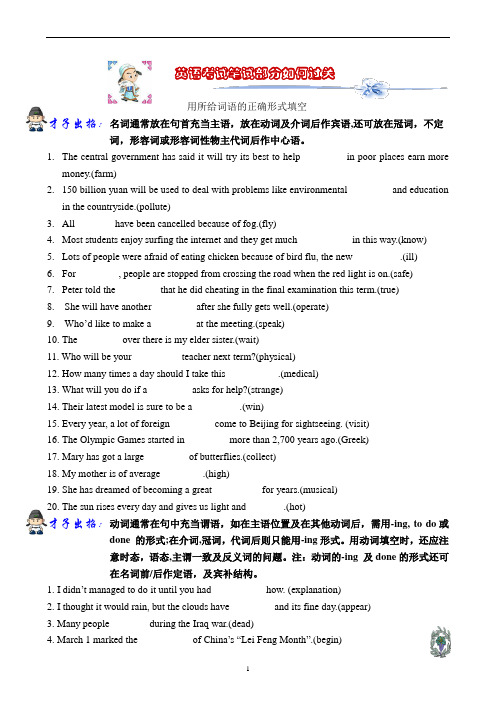
英语考试笔试部分如何过关用所给词语的正确形式填空才子出招:名词通常放在句首充当主语,放在动词及介词后作宾语,还可放在冠词,不定词,形容词或形容词性物主代词后作中心语。
1. The central government has said it will try its best to help ________ in poor places earn moremoney.(farm)2. 150 billion yuan will be used to deal with problems like environmental ________ and educationin the countryside.(pollute)3. All _______ have been cancelled because of fog.(fly)4. Most students enjoy surfing the internet and they get much __________ in this way.(know)5. Lots of people were afraid of eating chicken because of bird flu, the new _________.(ill)6. For ________, people are stopped from crossing the road when the red light is on.(safe)7. Peter told the ________ that he did cheating in the final examination this term.(true)8. She will have another ________ after she fully gets well.(operate)9. Who’d like to make a ________ at the meeting.(speak)10. The ________ over there is my elder sister.(wait)11. Who will be your _________ teacher next term?(physical)12. How many times a day should I take this __________.(medical)13. What will you do if a ________ asks for help?(strange)14. Their latest model is sure to be a _________.(win)15. Every year, a lot of foreign ________ come to Beijing for sightseeing. (visit)16. The Olympic Games started in ________ more than 2,700 years ago.(Greek)17. Mary has got a large ________ of butterflies.(collect)18. My mother is of average ________.(high)19. She has dreamed of becoming a great _________ for years.(musical)20. The sun rises every day and gives us light and _______.(hot)才子出招:动词通常在句中充当谓语,如在主语位置及在其他动词后,需用-ing, to do或done 的形式;在介词,冠词,代词后则只能用-ing形式。
人教版七年级全套英语语法课讲义
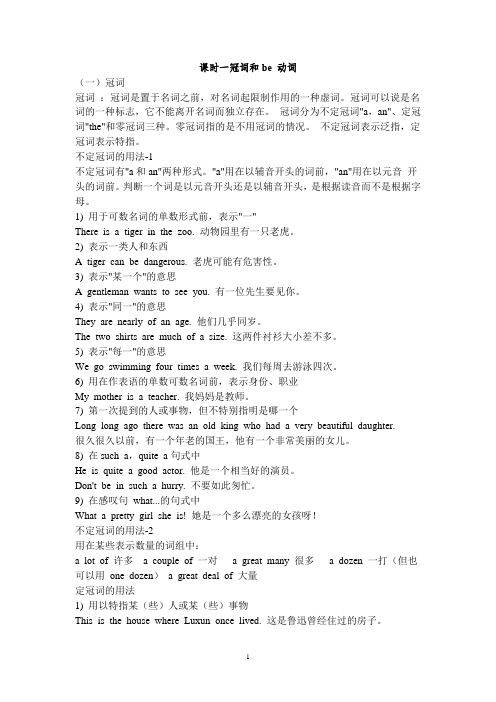
课时一冠词和be 动词(一)冠词冠词:冠词是置于名词之前,对名词起限制作用的一种虚词。
冠词可以说是名词的一种标志,它不能离开名词而独立存在。
冠词分为不定冠词"a,an"、定冠词"the"和零冠词三种。
零冠词指的是不用冠词的情况。
不定冠词表示泛指,定冠词表示特指。
不定冠词的用法-1不定冠词有"a和an"两种形式。
"a"用在以辅音开头的词前,"an"用在以元音开头的词前。
判断一个词是以元音开头还是以辅音开头,是根据读音而不是根据字母。
1) 用于可数名词的单数形式前,表示"一"There is a tiger in the zoo. 动物园里有一只老虎。
2) 表示一类人和东西A tiger can be dangerous. 老虎可能有危害性。
3) 表示"某一个"的意思A gentleman wants to see you. 有一位先生要见你。
4) 表示"同一"的意思They are nearly of an age. 他们几乎同岁。
The two shirts are much of a size. 这两件衬衫大小差不多。
5) 表示"每一"的意思We go swimming four times a week. 我们每周去游泳四次。
6) 用在作表语的单数可数名词前,表示身份、职业My mother is a teacher. 我妈妈是教师。
7) 第一次提到的人或事物,但不特别指明是哪一个Long long ago there was an old king who had a very beautiful daughter.很久很久以前,有一个年老的国王,他有一个非常美丽的女儿。
8) 在such a,quite a句式中He is quite a good actor. 他是一个相当好的演员。
七年级英语讲义
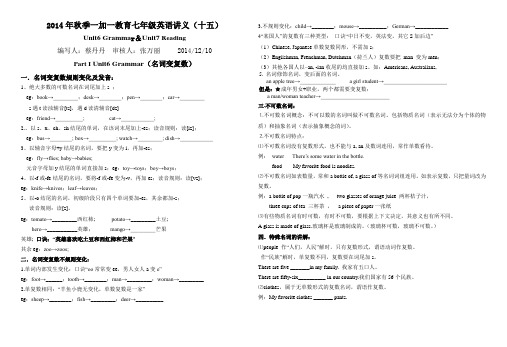
2014年秋季一加一教育七年级英语讲义(十五)Unit6 Gramma r&Unit7 Reading编写人:蔡丹丹审核人:张万丽 2014/12/10Part I Unit6 Grammar(名词变复数)一.名词变复数规则变化及发音:1、绝大多数的可数名词在词尾加上s ;eg:book→_________;desk→________;pen→________;car→_________s遇t读浊辅音[ts],遇d读清辅音[dz]eg:friend→__________; cat→____________;2.、以s、x、ch、sh结尾的单词,在该词末尾加上-es;读音规则:读[iz];eg:bus→________; box→__________; watch→_________; dish→____________ 3、以辅音字母+y结尾的名词,要把y变为i,再加-es;eg:fly→flies; baby→babies;元音字母加y结尾的单词直接加s;eg:toy→toys;boy→boys;4、以-f或-fe结尾的名词,要将-f或-fe变为-v,再加es;读音规则:读[vz];eg:knife→knives;leaf→leaves;5、以-o结尾的名词,初级阶段只有四个单词要加-es,其余都加-s;读音规则:读[z]。
eg:tomato→_________西红柿; potato→_________土豆;hero→___________英雄;mango→_________芒果英雄; 口诀:“英雄喜欢吃土豆和西红柿和芒果”其余eg:zoo→zoos;二.名词变复数不规则变化:1.单词内部发生变化:口诀―oo常常变ee,男人女人a变e‖eg:foot→______;tooth→________;man→_________;woman→_________2.单复数相同:―羊鱼小鹿无变化,单数复数是一家‖eg:sheep→________;fish→_________;deer→__________ 3.不规则变化:child→________;mouse→__________;German→____________4―某国人‖的复数有三种类型:口诀―中日不变,英法变,其它S加后边‖(1)Chinese, Japanese单数复数同形,不需加s;(2)Englishman, Frenchman, Dutchman(荷兰人)复数要把man 变为men;(3)其他各国人以–an, -ian收尾的均直接加s。
Unit 12021年春季七年级英语下册辅导讲义(人教版)
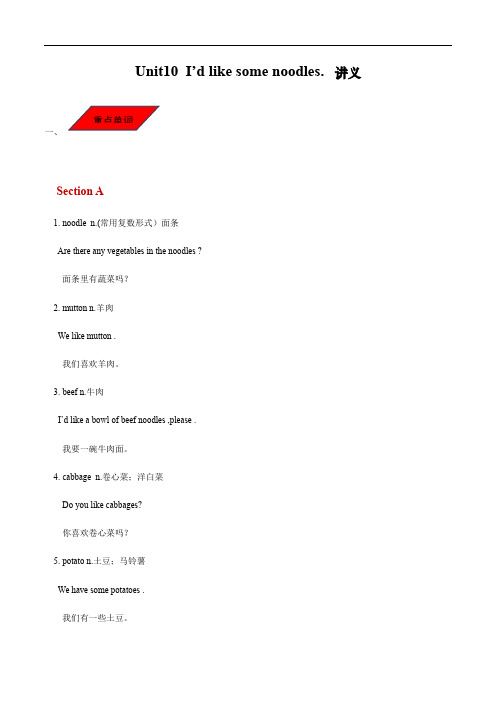
Unit10 I’d like some noodles. 讲义一、Section A1.noodle n.(常用复数形式)面条Are there any vegetables in the noodles ?面条里有蔬菜吗?2.mutton n.羊肉We like mutton .我们喜欢羊肉。
3.beef n.牛肉I’d like a bowl of beef noodles ,please .我要一碗牛肉面。
4.cabbage n.卷心菜;洋白菜Do you like cabbages?你喜欢卷心菜吗?5.potato n.土豆;马铃薯We have some potatoes .我们有一些土豆。
6.special n.特色菜;特价品adj.特别的;特殊的 The store has many specials today.这个商店今天有很多特价商品。
Why do people eat special foods on their birthday ?为什么人们会在生日那天吃特别的食物?7.would modal v.(表示意愿)愿意She would help me to learn English.她愿意帮助我学英语。
would like(表示意愿)愿意;喜欢What would you like ?您想要什么?8.yet adv.(常用于否定句或疑问句)还;仍然I’m not sure yet .我还不确定。
rge adj.大号的;大的One large bowl of beef soup ,please .请给我一大碗牛肉汤。
10.order n.&v.点菜;命令My father often orders me to do my homework.我父亲经常命令我做作业。
take one's order 点菜May I take your order ?请问您可以点菜了吗?11.size n. 大小;尺码What size would you like ?您想要多大尺码的?12.bowl n.碗one (large) bowl of…一(大)碗……One large bowl of rice ,please .请给我一大碗米饭。
- 1、下载文档前请自行甄别文档内容的完整性,平台不提供额外的编辑、内容补充、找答案等附加服务。
- 2、"仅部分预览"的文档,不可在线预览部分如存在完整性等问题,可反馈申请退款(可完整预览的文档不适用该条件!)。
- 3、如文档侵犯您的权益,请联系客服反馈,我们会尽快为您处理(人工客服工作时间:9:00-18:30)。
科目:英语年级:初一教师:夏若月2006-2007年第二学期第十五周视频讲义(06.16)单项填空1.Nelson Mandala was _______ of South Africa from 1994 to 1999. A.president B.a president C.President D.our president 2.He finished all the food in the bowl _______ she liked it.A.but B.then C.because D.because of 3._______ weather it was that day!C.How a bad D.How bad A.What a bad B.Whatbad4.He was in that village for _______.A.two and a half years B.two and half yearsC.two years and a half D.both A and C5.—Sorry, your address again. I _______ catch you.—24 Nanjing Road.A.didn’t B.won’t C.not D.don’t6.I put my hands _______ my ears because I couldn’t bear to listen.C.above D.atA.on B.over7.We worked from 8 a. m. to 2 p. m, so we _______ a rest at two.have B.stopped havingtoA.stoppedhaving D.stop to haveC.stop8.He was born in a town _______ the east coast of America.D.fromA.in B.on C.with9.He went to the train station _______.upB.to pick up memeA.pickedup D.to pick me upmeC.pick10.William Shakespeare was one of _______ in the world.A.the most famous writer B.the most famous writerswriter D.more famous writerfamousC.the11.Tom was the second _______ this maths problem.A.worked out B.works out C.working out D.to work out 12.Cars were _______ so people used bicycles or traveled by bus or train.D.dangerous A.crowded B.successful C.expensive13.—You forgot to make the bed.—Oh, so I did. _______ and do it at once.D.I did A.I’ll go B.I’m going C.Igo14.The meeting _______ two hours, and I almost fell asleep.D.made A.lasted B.opened C.took15.—_______, Mrs. Wang. —I’m happy you did.A.We enjoyed ourselves at the party B.We were lost yesterdayleave D.We didn’t finish the worktoC.Wehave完形填空Mr. Clark worked in an office. He had a lot of work to do every day. But later he began to ___1___ things and this made his work very ___2___. One day Mr. Clark said to himself, “I ___3___ go to see Dr. Martin.”He waited at least two hours in the doctor’s waiting-room ___4___ there were ___5___ people. They also wanted to see the doctor. ___6___ the nurse said to him, “You can come in and see Dr. Martin now.”“What can I do for you?” asked Dr. Martin.“Oh, doctor.” said Mr. Clark. “There is something wrong with my ___7___. I can’t remember ___8___. I have no way to keep things in mind for ___9___ than half a minute. And it’s making my work very difficult. I don’t know what to do. Can you help me?”“When did it start, Mr. Clark?” The doctor asked.“When did ___10___ start?” Mr. Clark asked.1.A.find B.forget C.remember D.miss2.A.difficult B.different C.freeD.happyD.have3.A.can B.mayC.must4.A.than B.because C.so D.whereC.littleD.much5.A.a lot of B.few6.A.At first B.At last C.At times D.At onceD.hand7.A.eyes B.workC.head8.A.anything B.anybody C.something D.nothingD.better9.A.little B.shorter C.moreD.howC.what10.A.where B.why阅读理解AGeneral Pershing was a great American officer. He was in the American army, and fought in Europe in the First World War.After he died, some people in his hometown wanted to remember him, so they put up a big statue (塑像) of him on a horse.There was a school near the statue, and some of the boys went there every day on their way to school and again on their way home. After a few months, some of them began to say “Good morning, Pershing” whenever they reached the statue and soon all the boys at the schoolwere doing this.One Saturday, one of the smallest of these boys was walking to the shops with his parents when he went to the statue. He said, “Good morning, Pershing” to it, but then he stopped and said to his parents. “I like Pershing very much, Mum and Dad, but who’s that strange man on his back?”1.General Pershing fought in Europe, but he was from _______.A.Europe B.England C.America D.Japan2.Some people put up a statue of _______.B.General Washington C.a horse D.General Pershing A.him3.The statue was _______ the school.A.not far from B.behind C.in D.very far from 4.The boys went there every day _______.A.on their way to school B.on their way homeandB D.after classAC.both5.The boy thought that _______ was Pershing.C.theD.the horsehouseA.the shop B.thestoneBFairfield is a small town. In the early morning, when the big clock above the door of the Farmer’s Band is striking six, everyone gets up in the town. Rain or shine, the milkman delivers the milk soon after six every morning. The paperboy throws the morning paper at the front doors. When Miss Mary Smith unlocks the door of the post office, you know it’s seven twenty. She has ten minutes to get ready for work. At seven thirty Miss Minnie Mason, headmaster of the Fairfield school, walks past the post office, waves to Marry and hurries on. At about twenty to eight children rush to school. Toward the end of the afternoon, the bank closes first, at five o’clock. Miss Mary leaves the post office half an hour after that. By six o’clock everything is closed along the main street except the gas station, the restaurant and the drugstore. Most people are at home for dinner. Every weekday, from Monday through Friday, people go to bed early in Fairfield, the streets are quiet and the houses are dark. The small town is getting ready for tomorrow.6.Everybody in the town gets up _______.A.when the sun rises B.after six every morningC.early in the morning D.when the big clock is striking six7.What time does Miss Mary Smith start to work?A.At 7: 00. B.At 7: 20. C.At 7: 30. D.At 7: 40.8.When do the children rush to school?A.Before Mary unlocks the door of the post office.B.Before the headmaster gets to school.C.At 8: 20.D.At 7: 40.9.After 6: 00 p. m _______ are still open.A.the restaurant and the gas stationB.The bank and the drugstoreC.the post office and the schoolD.the drug store and the post office10.Which of the following is true?A.Miss Mary Smith leaves the post office at 5: 15.B.The bank closes first at 5: 00 pm.C.When it rains the milkman doesn’t deliver the milk.D.The headmaster goes to work earlier than the paperboy.CMr. White was quite a busy lawyer (律师). He always worked all day. Sometimes he could not have a rest on Sundays, so he usually forgot the date.Last Saturday, he remembered it was his wife’s birthday. “I often forget her birthday,” he said to himself. “but not this time.” Then he went to a flower shop and bought some beautiful flowers on his way home. When Mr. White got home, he gave the flowers to Mrs. White and said, “Happy birthday! January 15 is your birthday. I don’t forget it.”“Yes. But my birthday was yesterday. It’s January 16 today. Any way, thank you all the same.” said Mrs. White.11.Mr. White was a _______ man, so he usually forgot something.B.busyC.happy D.good A.great12.Mr. White thought that Saturday was _______.A.January 13 B.January 14 C.January 15 D.January 16 13.He bought some flowers _______.A.after he went home B.before he finished his workSunday D.before he got homeC.on14.When Mr. White gave his wife the flowers, she _______.A.was very happy because Mr. White remembered thatB.was not very happy because Mr. White forgot thatC.also said “thank you”D.said nothing15.From this passage we know Mr. White _______.A.remembered his wife’s birthday, forgot the dateB.forgot his wife’s birthday, but remembered the dateC.remembered the date and his wife’s birthdayD.forgot the date or his wife’s birthdayDWilliam’s reportWe went to Thailand for our summer vacation last year. It was our first trip to Asia. Weloved it. We spent a week in Bangkok and did something different every day. We went to thefloating market very early one morning. We didn’t buy anything there, we just looked. Anotherday, we went to Wat Phra Keo, the famous Temple of the Emeral Buddha. It was reallyinteresting. Then we saw two more temples nearby. We also went on a river trip somewhereoutside Bangkok. The best thing about the trip was the food. The next time we have friendscome over for dinner, I’m going to cook Thai food.Sue’s reportLast summer, we spent our vacation in Thailand. We were very excited-it was our first tripthere. We spent two days in Bangkok. Of course, we got a river bus to the floating market. Webought some delicious fruit there. The next day we went to a very interesting temple called theTemple of the Emerald Buddha. We didn’t have time to visit any other temples. However, wewent to two historic cities – Ayuthaya and Sukhothai. Both have really interesting ruins.Everything was great. It’s impossible to say what was the best thing about the trip.根据短文内容,填写表格,符合内容的画“√”Sue William1.visited Thailand for the first time2.stayed for two days in Bangkok3.visited the floating market4.bought fruit in Bangkok5.saw some historic ruins6.took a trip on the river7.loved the food the most8.enjoyed everything词形转换1.Han Hong is one of the popular _________(sing)in China.2.In the old days, it was ________(comfort)to live in the house without air-conditions.3.Tom was _________(lose)in the forest yesterday.4.I think you can ask him _________(help)you.5.Lucy and Lily sit in the _________(five)row.句型转换1.China became the member of WTO in 2001.(改为同义句)China ____________ WTO in 2001.2.He was very naughty.(就划线部分提问)____________ was he ____________?3.Nelson Mandela was born in South Africa on 18th, 1918.(就划线部分提问)____________ and ____________ was Nelson Mandela born?4.He had a TV set and a fridge.(改为否定句)He ____________ ____________ a TV set ____________ a fridge.5.They did their homework at home.(改为一般疑问句)____________ they ____________ their homework at home?完成句子1.她五岁的时候随父母搬到了天津。
